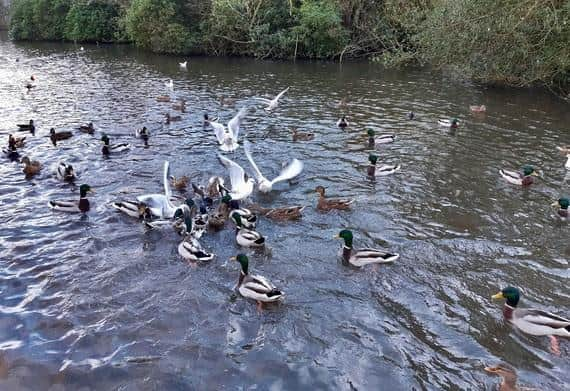Bird keepers of Sheffield urged to take action to limit spread of avian flu as first cases found in city
and live on Freeview channel 276
At least 66 cases of the infectious bird-killing disease have been found in England.
They now include three found in Sheffield last week, the city’s first recorded cases.
Advertisement
Hide AdAdvertisement
Hide AdBird keepers are being reminded to keep their birds indoors and to follow strict measures to limit the spread of the disease.


Ian Ashmore, head of environmental regulation at Sheffield City Council, said: “There have been multiple findings of Avian flu in dead wild birds from sites across Great Britain.
“This week we have had the first positive cases in dead birds in Sheffield. These were a Canada goose, a swan and a gull.
“If anyone finds a dead or visibly sick bird they should not touch it. For dead birds in Sheffield parks, please call us on 0114 2500500.”
Advertisement
Hide AdAdvertisement
Hide AdWhether birdkeepers have pet birds, commercial flocks or just a few birds in a backyard flock, the guidance must be followed to limit the number of cases in the UK and stop the disease.
The Department for Environment, Food and Rural Affairs (DEFRA) is encouraging all keepers to register their birds with them, and keep contact details up to date, so that they can contact owners quickly if there is a disease outbreak in an area and if action needs to be taken.
An Avian Influenza Prevention Zone (AIPZ) came into force across Great Britain in November 2021 and means that bird keepers must:
– house or net all poultry and captive birds to keep them separate from wild birds
Advertisement
Hide AdAdvertisement
Hide Ad– cleanse and disinfect clothing, footwear, equipment and vehicles before and after contact with poultry and captive birds – if practical, use disposable protective clothing
– reduce the movement of people, vehicles or equipment to and from areas where poultry and captive birds are kept, to minimise contamination from manure, slurry and other products, and use effective vermin control
– thoroughly cleanse and disinfect housing on a continuous basis
– keep fresh disinfectant at the right concentration at all farm and poultry housing entry and exit points
Advertisement
Hide AdAdvertisement
Hide Ad– minimise direct and indirect contact between poultry and captive birds and wild birds, including making sure all feed and water is not accessible to wild birds
Anyone who identifies breaches of the above controls in Sheffield that mean poultry and wild birds can mix can report it at [email protected].
Avian flu is primarily a disease of birds and the risk to the general public’s health is very low, although one case has been recently found in south-west of England. Cases like this are extremely rare.
For other locations please call the DEFRA helpline on 03459 335577.
Advertisement
Hide AdAdvertisement
Hide AdDEFRA will then collect some of these birds and test them to look at the way the disease is spreading and the types of birds involved. Not all birds will be collected. Wild birds are susceptible to a range of diseases and injuries and, of course, not all dead birds will have been infected with avian influenza.
“Signage is going up in parks to warn visitors to avoid contact with wild birds and for people to wash their hands frequently, however we would repeat that the risk to humans is extremely low.”
Comment Guidelines
National World encourages reader discussion on our stories. User feedback, insights and back-and-forth exchanges add a rich layer of context to reporting. Please review our Community Guidelines before commenting.

